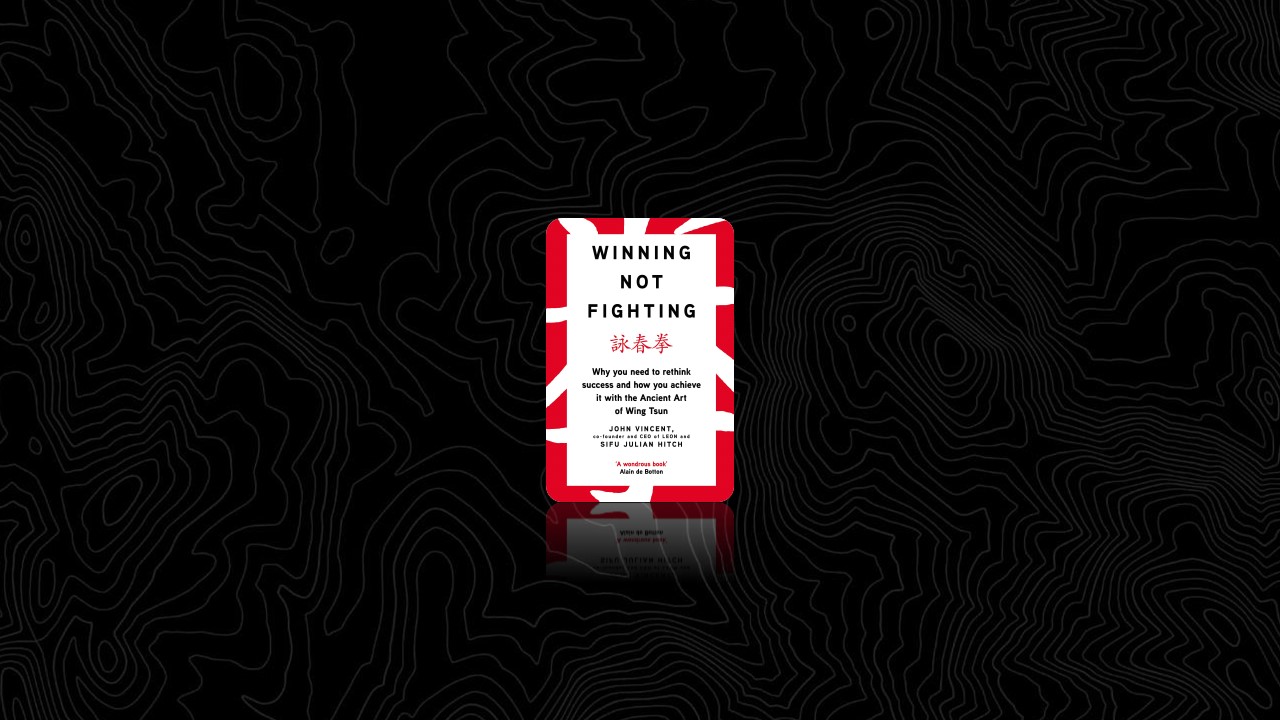Wing Tsun Kung Fu is an ancient martial art which contains wisdoms to teach you how to succeed in life: at home, at work, in combat. And it does this by revealing that, ultimately, winning cannot be achieved by fighting.
Wing Tsun approaches winning from a completely different perspective from any other martial art. Its objective is to not create conflict – and, if conflict arises, to address it with the minimum of force in the fastest time. It provides the skills to prevail against a larger, stronger opponent. And it understands that the toeByto-toe trading of blows cannot succeed.
Conflict is diametrically opposed to winning. It’s easy to romanticize fighting as ‘glorious’ or ‘noble’, but any war veteran will tell you that’s far from the truth. There is no such thing as a ‘nice fight’. People are injured or killed.
The Shaolin monks summed this up with their saying:
It is better to move away than grab;
It is better to grab than hit;
It is better to hit than hurt;
It is better to hurt than kill;
It is better to kill than be killed.
Winning Not Fighting contains four Doors to guide your development, with a total of eight wisdoms supporting them. These are structured sequentially as follows.
THE FIRST DOOR: SIU NIM TAO – BECOME CONSCIOUS
Key theme: Understanding who you are, why you do what you do, and how you work.
– Wisdom 1: Know Yourself
– Wisdom 2: Staying Relaxed
THE SECOND DOOR: CHUM KIU – CONSCIOUSLY CONNECT
Key theme: How to build effective relationships with others.
– Wisdom 3: Don’t Force
– Wisdom 4: Positivity
THE THIRD DOOR: BIU JEE – SELF-REALIZATION
Key theme: How to step into, and utilize, your innate power.
– Wisdom 5: Simplicity
– Wisdom 6: Freedom and Responsibility
– Wisdom 7: Expect to Be Punched
THE FOURTH DOOR: MUK YAN CHONG (WOODEN DUMMY) – BEYOND SELF
Key theme: Understanding your wider connection to the world around you.
– Wisdom 8: Mastery
Know Yourself
The first wisdom of Siu Nim Tao is Know Yourself. Sustained success requires you to be you. Over time, if you attempt to be something you are not, it creates huge internal tension and conflict. In Wing Tsun, self-knowledge allows you to gain a far deeper internal understanding, awareness and perspective, which has immense power to transform every aspect of your life.
Staying Relaxed
The second wisdom teaches you the importance of Staying Relaxed. By tuning into your natural state of being, it gives you the ability to face any unexpected situation with clarity, poise and assurance. It takes your quest for self-discovery and empowerment a level deeper.
The wisdom of Staying Relaxed creates an interesting first response for most of us. We all know we should be capable of a state of relaxation, but it seems a nicety rather than a necessity most of the time.
Stress is linked to the six leading causes of death, and you just have to look at the slightly scary statistics about high achievers, and how soon they die after retirement, to realize that inherent tension is not all it’s cracked up to be. There has to be another way to win. And there is … It’s Staying Relaxed.
Don’t Force
The wisdom of Don’t Force teaches you how to create healthy, empowered relationships. It illustrates both the fallacy and the illusion of attempting to use control when building and managing networks of people. It sets you up with the conditions for winning, and also maintaining this in the long term.
None of us likes to be forced. So why do we try and force others when it doesn’t really work?
Forcing sets up a ‘churn and burn’ culture – when one person won’t do something, you find someone else who will. There are, of course, varying degrees of this, but the result is the same: forcing creates repression. Repression creates resentment. Resentment creates conflict, both overt and covert. It becomes an endless, draining cycle.
Positivity
Positivity is a mainstay of Wing Tsun. It is about proactive action, rather than reactive behaviour. Whereas Staying Relaxed taught you about your internal response to a challenge, this wisdom now focuses on your engagement with the world. It shows you how to build meaningful connections, moving past a life of just surviving into one of thriving.
In Wing Tsun, the mind is not just an abstract or spiritual concept but a vital reality that makes the difference between your life and death. As any veteran of combat will tell you, mindset counts for far more than any training, talent or equipment.
Simplicity
Tzu Jan (Simplicity) teaches us that we only need the most basic elements to achieve great success, contentment and self-realization. Physically, Simplicity is the ability to use the lowest number of movements to achieve success. We quantify this with the ‘and test’. This means that in any combat situation, there should only be one motion to any attack. Each movement you add before winning is an ‘and’.
This is why Wing Tsun uses the principle of simultaneity – defending and counter-attacking in one response. The more movements you add in, the more likely it is that you will be unsuccessful. It takes too long, requires mental processing (as opposed to an instinctive response) and stops you adapting. If a martial art can successfully defend against a strong, very fast, straight attack, then it’s on a good grounding. If it can’t, then it is based on a fallacy. Simplicity becomes even more imperative when you are faced with more than one assailant. With a significant number of variables already, you cannot afford to add any more complications. In combat, failing to master Simplicity can have fatal results.
Freedom and Responsibility
Freedom and Responsibility is perhaps one of the greatest dichotomies of Wing Tsun. Its overriding teaching is simple – that by allowing people freedom, they take on the greatest amount of responsibility. In Wing Tsun, this is taught through the sixth wisdom of Lat Sau, meaning ‘free hand’.
This wisdom goes to the heart of what makes a ‘martial art’ – the expertise and discipline required to be successful in combat, combined with the artistic freedom to develop continually and be yourself. Centuries of enlightened but pragmatic masters realized that this was an essential combination for worldly and spiritual success. The perfect synergy between the ‘martial’ and ‘art’ elements is a healthy creative tension that keeps harmony but allows the best progression. This balance is most famously symbolized by the Taoist Yin Yang sign.
Expect to Be Punched
Everyone gets ‘punched’ by life at some point. The question is, what happens next? In Wing Tsun, Expect to Be Punched gives you the ability to thrive despite the perceived adversity against you. It is the ‘grit’ that allows you to continue when everyone else has given up. Importantly, it also guides you back to reality. It is an additional ‘check-in’ to achieve an egoless state.
Expect to Be Punched is, perhaps, the single most important factor in achieving long-term success and happiness. In the West, this is often termed resilience, but Wing Tsun takes a deeper view and goes further.
The resilience of a material is its ability to return to its original shape after being compressed or stretched. In Wing Tsun this is not enough; we want the ability to expand, grow and develop. Resilience can also have a negative connotation, implying that the world is tough, against you, and that you have to learn how to battle through it as best you can. Wing Tsun feels no such thing. Life is neither tough nor easy. It is all about your perspective and what you do with it.
Mastery
The final wisdom of Wing Tsun, Mastery, consists of three elements: focusing on one thing, practising in the present moment, and letting go of the need for outcomes.
Mastery, on the face of it, appears to be something to be attained. And a master appears to be someone who is the best they can be. What you are about to discover is that this is not the case. The opposite is true. Mastery is an approach, a mindset and a practice, but it is not an outcome.
Indeed, by practising Mastery, it is essential to be in the present moment without grasping for an outcome. There is a supreme irony to Mastery – the more you focus on your present-moment experience, the more likely you are to achieve the outcome. But when it does come, you will be less fixated on the result or its value.


